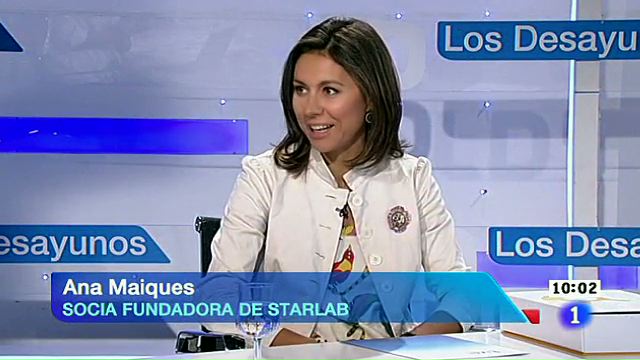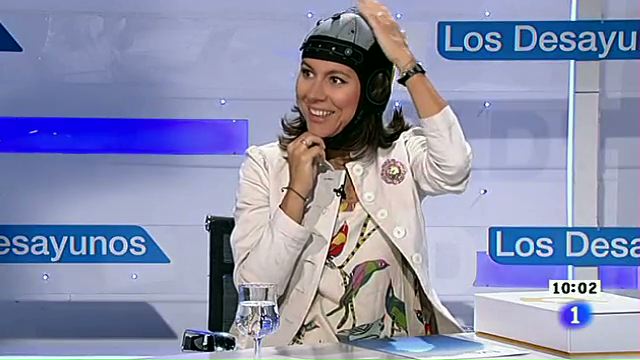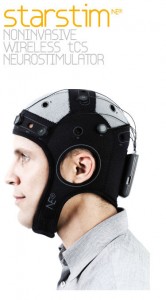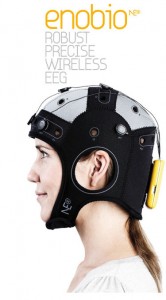Neuroscientist Daniel Chao created a headset that hacks your brain with electricity so you can learn as fast as a kid again. It’s called Halo, and it helps you learn motor skills faster. Athletes use it; musicians too. But we’re not far from a future when Halo could help anyone master anything. Where will that take us? Host Caterina Fake leads the journey, joined by Comedian Baratunde Thurston and Quartz Editor in Chief Kevin Delaney, who help Daniel future-cast, and see his invention through the future best for humanity.
Tag Archives: audio
Ana Maiques of Neuroelectrics – DIY tDCS Podcast # 1
Well here we go! Episode one of the DIY tDCS podcast. Ana Maiques is co-founder (with Giulio Ruffini) of Spanish-based Starlab. Their spin-off company, Neuroelectrics makes Enobio, a research-quality wireless EEG device, and Starstim, a multi-channel wireless tcs & tDCS device. Download the interview here (zipped mp3). Show notes after the fold.
(If you speak Spanish you might enjoy the interview these photos were taken from.) Also, if you’re an EEG or tDCS researcher or clinician (or VC) on the East Coast, Ana is frequently in the New York and Boston area and is happy to discuss Enobio and Starstim. Neuroelectrics will be at the Advances in Mediation Research conference in NY Jan. 17 2013. (Schedule) Check out the Neuroelectrics blog for excellent tDCS and EEG info.
Show Notes
Starlab is the parent company > Space (sensors) + Neuroscience
Cutting edge research > impact on society… products and services
Twelve years of research in neuroscience > Enobio, Starstim
Initial market is early adopters – researchers, clinicians and practitioners
Starstim (tDCS) > chronic pain, stroke rehabilitation (later… depression >> cognitive enhancement, addiction)
Medically certified in Europe and Canada
Filing 510k for Enobio in the US
Starstim has 8 channels for use as HD tDCS but can also use traditionally
Can also do tACS (alternating current), or random noise stimulation and at the same time Simultaneously record EEG
Can also use dry EEG electrodes
Roi Cohen Kadosh Oxford study, kids etc. (Link to video we discussed. NewScientist)
Study will determine if tDCS is efficacious in enhancing performance in certain areas (math)
Will have implications for people with Alzheimers
Partnerships with 15 hospitals doing research with Starstim
8 in U.S. and 7 in Europe. Different pathologies. Results to be published soon.
Post-stroke rehabilitation is a great place to see the effectiveness of tDCS
tDCS > Motor recovery… hand rehabilitation…
Can thereby measure the degrees of movement and improvement very objectively
Couple of groups showing very measurable results.
The Muse, Neurosky, Emotiv Home EEG devices?
Limitation is number of channels.
Started Enobio with 4 channels, but feedback from medical community lead to developing a 20 channel Enobio.
For certain applications – games, BCI etc, the home EEG devices might be fine
But we’re looking at the medical application of EEG.
Doctors and researchers require the maximum coverage of the head.
Signal quality is very important.
EEG application
Emotion recognition, neural marketing, traumatic brain injury – concussion
BCI – wheelchairs.
Sponsoring a conference in NY on meditation. Sloan Kettering pre-chemo
medications >> less pain, better toleration of treatment.
Spanish VCs even more conservative since crisis
Patents >> cloud-based database recording experimental data
Software runs on a Mac.
“We always said we want to be the Apple of neuroscience…”




